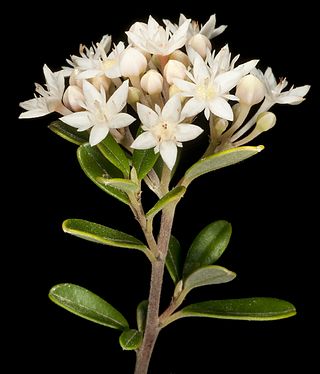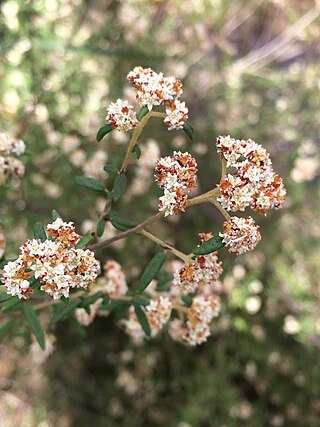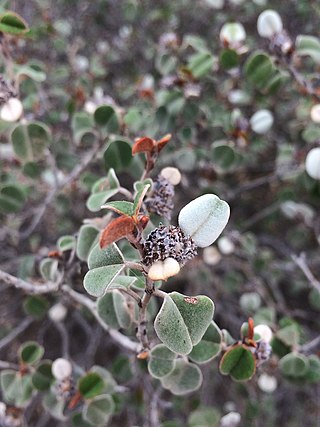
Pomaderris myrtilloides is a species of flowering plant in the family Rhamnaceae and is endemic to near-coastal areas of southern Western Australia. It is an erect shrub with many branches, narrowly egg-shaped elliptic or wedge-shaped leaves with the narrower end towards the base, and cream-coloured to pale pink flowers.
Spyridium glaucum is a species of flowering plant in the family Rhamnaceae and is endemic to a restricted area of south-western Western Australia. It is an erect or spreading shrub with egg-shaped leaves, and clusters of 3 to 6 rusty-hairy flowers.
Spyridium minutum is a species of flowering plant in the family Rhamnaceae and is endemic to the south of Western Australia. It is an erect or spreading shrub with broadly egg-shaped or heart-shaped leaves, and groups of two or three hairy, white flowers.
Spyridium mucronatum is a species of flowering plant in the family Rhamnaceae and is endemic to the south of Western Australia. It is an erect or spreading shrub usually with narrowly oblong leaves, and dense clusters of up to ten densely hairy, white to yellow flowers.

Spyridium riparium is a species of flowering plant in the family Rhamnaceae and is endemic to the south of Western Australia. It is an erect shrub, usually with narrowly egg-shaped leaves, and clusters of densely hairy, white or cream-coloured flowers.
Cryptandra craigiae is a flowering plant in the family Rhamnaceae and is endemic to a restricted area of southern Western Australia. It is a shrub with linear leaves and dense clusters of white or cream-coloured, tube-shaped flowers.

Spyridium tricolor is a species of flowering plant in the family Rhamnaceae and is endemic to southern continental Australia. It is an erect shrub with broadly elliptic to round leaves, and dense clusters of densely woolly-hairy, cream-coloured flowers.
Spyridium villosum is a species of flowering plant in the family Rhamnaceae and is endemic to the south-west of Western Australia. It is a small shrub with shaggy-hairy branchlets, linear to oblong leaves and dense heads of hairy flowers with broad brown bracts at the base.
Stenanthemum complicatum is a species of flowering plant in the family Rhamnaceae and is endemic to the southwest of Western Australia. It is a woody, erect or straggling shrub with densely hairy young stems, broadly egg-shaped leaves and densely woolly-hairy heads of tube-shaped flowers.

Stenanthemum emarginatum is a species of flowering plant in the family Rhamnaceae and is endemic to the southwest of Western Australia. It is a spreading to prostrate shrub with sparsely hairy young stems, narrowly fan-shaped to linear leaves and densely, shaggy-hairy heads of white or cream-coloured flowers.
Cryptandra intonsa is a flowering plant in the family Rhamnaceae and is endemic to inland Western Australia. It is an erect or spreading shrub with linear to narrowly oblong leaves and white or cream-coloured, tube-shaped flowers arranged in head-like clusters.

Stenanthemum intricatum is a species of flowering plant in the family Rhamnaceae and is endemic to the southwest of Western Australia. It is an erect to spreading, often wiry shrub with sparsely hairy young stems, egg-shaped to fan-shaped leaves and greyish, densely softly-hairy heads of white or cream-coloured flowers.
Stenanthemum limitatum is a species of flowering plant in the family Rhamnaceae and is endemic to the southwest of Western Australia. It is an erect or straggling shrub with sparsely hairy young stems, egg-shaped to fan-shaped leaves and greyish, softly-hairy heads of white or cream-coloured flowers.
Cryptandra micrantha is a flowering plant in the family Rhamnaceae and is endemic to the southwest of Western Australia. It is a prostrate or upright shrub with spiny branchlets, narrowly oblong to elliptic leaves and dense clusters of white or cream-coloured, tube-shaped flowers.

Stenanthemum nanum is a species of flowering plant in the family Rhamnaceae and is endemic to the south-west of Western Australia. It is a prostrate shrub with hairy young stems, broadly egg-shaped leaves with the narrower end towards the base, and densely silvery-hairy heads of white or cream-coloured flowers.
Stenanthemum newbeyi is a species of flowering plant in the family Rhamnaceae and is endemic to a restricted area in the south of Western Australia. It is an erect or spreading shrub with hairy young stems, egg-shaped leaves with the narrower end towards the base, and clusters of rust-coloured, densely shaggy-hairy flowers, surrounded by whitish floral leaves.
Cryptandra monticola is a flowering plant in the family Rhamnaceae and is endemic to the south-west of Western Australia. It is an erect or spreading shrub with linear or narrowly oblong to elliptic leaves and head-like clusters of white, tube-shaped flowers.

Stenanthemum pumilum is a species of flowering plant in the family Rhamnaceae and is endemic to the southwest of Western Australia. It is a low, compact shrub with hairy young stems, egg-shaped leaves, sometimes with the narrower end towards the base, and clusters of 10 to 30 white to creamy-white, woolly hairy, tube-shaped flowers.

Stenanthemum reissekii is a species of flowering plant in the family Rhamnaceae and is endemic to the south-west of Western Australia. It is an erect or low-lying shrub with hairy young stems, egg-shaped or narrowly egg-shaped leaves with the narrower end towards the base, and clusters of densely hairy white or cream-coloured flowers.
Stenanthemum stipulosum is a species of flowering plant in the family Rhamnaceae and is endemic to inland Western Australia. It is an erect or low-lying shrub with densely hairy young stems, egg-shaped with the narrower end towards the base, and clusters of 10 to 30 densely hairy white or cream-coloured flowers, sometimes surrounded by whitish floral leaves.








